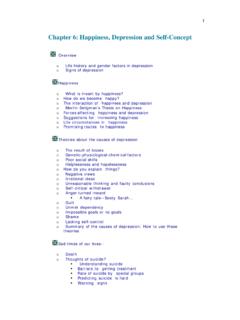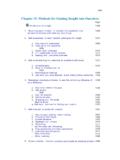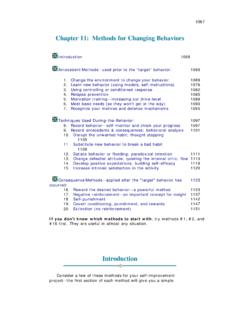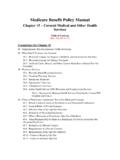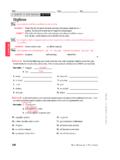Transcription of Chapter 7: Anger and Aggression - Psychological …
1 1. Chapter 7: Anger and Aggression Introduction An Overview of Anger Statistics o Definition of terms o Recognizing Anger Hidden Anger passive-aggressiveness How angry are you? o A case of jealous Anger Understanding Anger : Theories and facts o How much hatred is there in the world? The 2002 WHO Report o How do we get so angry? Sternberg's theory o How Anger interacts with other emotions and factors o Are some people just evil ? o The control of emotions Society tries to control meanness with punishment Society doesn't try prevention o Innate, genetic, hormonal and physical factors o The Frustration- Aggression Hypothesis Displacement of Anger My conclusions about catharsis Historical overview.
2 Frustration- Aggression Theory o Social Learning Theory o Aggression and child rearing practices o Self-hatred and self-reports describing Anger o Mental processes that generate Anger / Aggression Disliking people who are different Hating people for "no reason". Pain leads to Aggression o Internal dynamics of Aggression Psychoanalysis Anger -generating thoughts Put-down games & Psychological put-downs Anger , anxiety, guilt, depression, dependency and sex The effects of gender roles and cultural differences Psychological excuses for Aggression ; Anger may pay off Anger in intimate relationships o Marital conflict Dealing with the intimate enemy.
3 Trying to get our way 2. Finding better ways to resolve Anger Psychological abuse in intimate relationships o Physical abuse of spouses and children How do we start being physical? Statistics about abuse of loved ones . How common is wife rape? Abuse within the family Why do women stay? Can abusers change? Long-term effects of abuse within the family Books and websites about domestic violence o Child abuse The consequences of child abuse or severe punishment Sources of information: Dealing with problem children Anger is usually a two-way street o Parent-teenager conflicts Getting closer again o Jealousy Distrusting others o How to become more trusting Disliking others without valid reasons.
4 Prejudice o Unconscious prejudice o Understanding our own prejudices Allport and DuBois o Prejudice can take many forms o Extreme prejudice o You don't think you are prejudiced any more? o Is intimacy a possible antidote for racial prejudice? o Experimentally created prejudice and new research o The authoritarian personality and prejudice o Integration: Is it reducing racial prejudice? o New methods for changing stereotypes, emotions and prejudice o Self-help methods to reduce our prejudice o Books and websites about reducing prejudices Methods for handling our own Anger / Aggression o An important long-term concern o Self-help tailored to each person's needs o Four popular books and tidbits about reducing Anger Bradley P.
5 Barris Les Carter Carl Semmelroth 3. Lynne Namka Tidbits of information about Anger and violence Emotional rumination vs. thoughtful reflection o Using methods from different levels for your own self-help o Level I: Behaviors and simple thoughts o Level II: Methods for reducing Anger o Level III: Skills to avoid Anger o Level IV: Cognitive methods for reducing your Aggression Buddhist teachings about controlling Anger More cognitive methods described in this book Forgiveness Details of cognitive ways to reduce Anger o Level V.
6 Be aware of and neutralize unconscious causes o Suggested books for specific Anger problems o Websites and videos o Warning: An angry situation is dangerous Dealing with an aggressive person o Coping with rape--a horrible crime o Dealing with a stalker o Recommended readings about aggressive people o Reducing the other person's Anger o The angry child or violent teen If you are a victim of violence or bullying Social-educational solutions to violence 4. Anger and Aggression This Chapter will provide (1) signs of Anger , (2) theories about how and why Aggression develops, and (3) means of preventing or coping with Anger (in yourself and in others).
7 Introduction An Overview of Anger How we deal with stress, disappointments, and frustration determines the essence of our personality. In this Chapter we consider frustration and Aggression . Anger may do more harm than any other emotion. First of all it is very common and, secondly, it upsets at least two people--the aggressor and the aggressed against. There are two problems: how to prevent or control your own Anger and how to handle someone aggressing against you. This Chapter attends more to self-control. The overall effects of Anger are enormous (Nay, 1996).
8 Frustration tells us "I'm not getting what I want" and eventually Anger is related to violence, crime, spouse and child abuse, divorce, stormy relationships, poor working conditions, poor physical health (headaches, hypertension, GI disturbances, heart attacks), emotional disorders, and so on. Just how widespread is hostility? Very! Psychology Today (1983) asked, "If you could secretly push a button and thereby eliminate any person with no repercussions to yourself, would you press that button?" 69% of responding males said yes, 56% of women.
9 Men would most often kill the U. S. president or some public figure; women would kill bosses, ex-husbands or ex- boyfriends and former partners of current lovers. Another survey of college students during the 80's indicated that 15% agreed that "if we could wipe out the Soviet Union, and be sure they wouldn't be able to retaliate, we should do it." That action could result in over 100 million deaths! The respondents seemed to realize the great loss of life because 26% said, "the United States should be willing to accept 25 million to 50 million casualties in order to engage in nuclear war.
10 " What an interesting combination of intelligence and mass violence in the same species. In light of the subsequent disintegration of the Soviet Union, this kind of pugnacious, arrogant, uncaring thinking is really scary. The problem was an unwillingness to carefully consider the atrocities of nuclear warfare plus a macho toughness engendered by the 1980's Cold War rhetoric. For reasons I hope to soon make clearer, Americans are amazingly violent compared to people in other countries. In 2002, approximately 290 million Americans suffered 23 million crimes.

